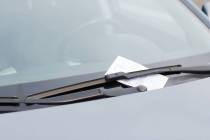Unions seek business tax to benefit education
CARSON CITY - The state AFL-CIO and the Nevada State Education Association were expected to file a petition with the secretary of state today, calling for a
2 percent tax on business profits.
Funds raised from the tax would be earmarked for public schools. Businesses earning $1 million or less in profits would be exempt from the tax.
Danny Thompson, executive secretary of the AFL-CIO, said Tuesday he expects the tax, if approved, to bring in $400 million to $500 million a year.
"Clark County has the fifth-largest school district in the county and graduates only 65 percent of the seniors," he said. "That is not acceptable. The
35 percent who fail don't have a chance to steal a job."
Hundreds of district teachers could lose their jobs this fall because of the lack of revenue, in part because of an arbitrator's decision requiring the district to continue giving raises to teachers. The district had sought to freeze salaries to make up for a budget shortfall.
Thompson's petition calls for changing a state law. Supporters need to secure 72,352 valid signatures by Nov. 13. If they do, then the 2013 Legislature must decide whether to implement the tax within the first 40 days of the legislative session.
If legislators refuse, as expected, then the tax would be placed before voters in the November 2014 election. Thompson had vowed to put a tax measure before voters after legislators in 2011 failed to approve two tax measures.
Details of the petition will be announced by Lynn Warne, NSEA president, and others during a filing ceremony at the state Capitol. Thompson will be unable to attend the ceremony.
He said that a 2 percent business tax rate is less than most in states and that it would not affect small businesses because no tax will be collected on the first $1 million in profits.
"This tax will not have an impact on small business," he said.
Thompson said their intention also is to phase out the 1.17 percent modified business tax that most employers pay on their employees' wages after the new tax takes effect.

















